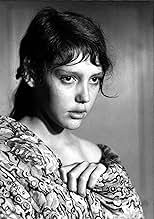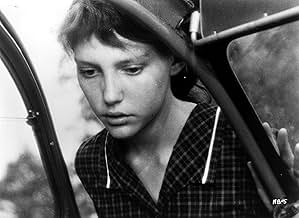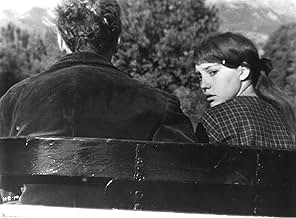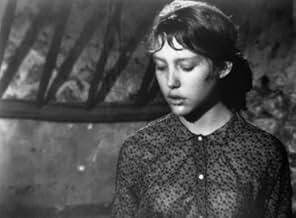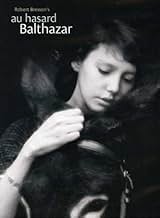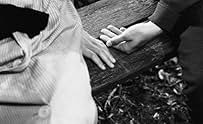AVALIAÇÃO DA IMDb
7,7/10
24 mil
SUA AVALIAÇÃO
A história de um jumento maltratado e das pessoas ao seu redor. Um estudo sobre santidade e uma peça que faz relação com "Mouchette, a Virgem Possuída", também de Robert Bresson.A história de um jumento maltratado e das pessoas ao seu redor. Um estudo sobre santidade e uma peça que faz relação com "Mouchette, a Virgem Possuída", também de Robert Bresson.A história de um jumento maltratado e das pessoas ao seu redor. Um estudo sobre santidade e uma peça que faz relação com "Mouchette, a Virgem Possuída", também de Robert Bresson.
- Prêmios
- 7 vitórias e 2 indicações no total
Mylène Van der Mersch
- Nurse
- (as Mylène Weyergans)
Avaliações em destaque
For all its formal brilliance, this is one of the least watchable films in the world, despite its enchanted opening and fairy tale elements. Seen through the eyes of a much-abused donkey, we are treated to a litany of corruption, legal (a man is accused of fraud), social (provincial France has never seemed so pinched, arid, spiritually void, with its inhabitants leading lives, in Joyce's words, of 'quiet desperation'), criminal (a gang of violent teenage smugglers), and personal (the leader of said gang rapes, with his cronies, his girlfriend, then locks her up naked), as well as a murder and suicide. What makes this possibly bearable is the limpidity and formal beauty of Bresson's style, and admirers refer to his pinpointing spiritual grace in human suffering, but I wouldn't count on it.
During the nineteenth century ,the comtesse de Segur wrote a novel for the children called "memoirs of a donkey" .A very pious writer,she chose the donkey as a symbol of humility...as Robert Bresson did I suppose.The very first pictures of the movie,with the children,"christening" the donkey ,might be a nod to the writer whom the young Bresson,like all his generation must have read when he was a young boy."Au hasard Balthazar " is an updated version of "les memoires d'un ane" ,but a very austere story:although Bresson's work enjoys a very high rating on the site,I must say that it's not for all tastes.I cannot imagine,say, a "matrix" fan getting enthusiastic about it.
Bresson's actors are non -professionals -with the exception of Anne Wiazemski,but it was her debut;then she became the par excellence intellectual actress,for the likes of Godard,Tanner and Garrel,all directors that easily make me yawn my head off-,but do not expect a "natural "performance.I hope the non-French speaking who wrote a comment saw the movie in French with English subtitles.Dubbed in another language ,Bresson's works lose a lot of their originality.Because the actors speak in a distant voice,in a neutral style as if they were reciting Descartes's "the Discourse on Method".They never show any emotion,even through their darkest hour (not even after the heroine's rape).
Bresson films his human characters as if they were Martians ,and his sympathy for the donkey is the only pity he has to give us.This beast of burden seems to carry on its back all the sins of the world,and his route is a calvary.A woman says "this donkey is a saint" .
Bresson showed us the Beast in Man and the Man in Beast.
Bresson's actors are non -professionals -with the exception of Anne Wiazemski,but it was her debut;then she became the par excellence intellectual actress,for the likes of Godard,Tanner and Garrel,all directors that easily make me yawn my head off-,but do not expect a "natural "performance.I hope the non-French speaking who wrote a comment saw the movie in French with English subtitles.Dubbed in another language ,Bresson's works lose a lot of their originality.Because the actors speak in a distant voice,in a neutral style as if they were reciting Descartes's "the Discourse on Method".They never show any emotion,even through their darkest hour (not even after the heroine's rape).
Bresson films his human characters as if they were Martians ,and his sympathy for the donkey is the only pity he has to give us.This beast of burden seems to carry on its back all the sins of the world,and his route is a calvary.A woman says "this donkey is a saint" .
Bresson showed us the Beast in Man and the Man in Beast.
Maybe I'm not as completely overwhelmed with the work of the immensely revered director Robert Bresson as others are, and I almost wish I was more so. I do know from the other films I have seen of his- Pickpocket and A Man Escaped- that he is one of the superior craftsmen of his time in France, a veritable storyteller with a very precise, original craftsmanship and way about telling his stories that shows compromise is nowhere in sight. However I don't think, try as I might (and I do love other films that do evoke religious connotations and metaphors like with Dreyer and Rossellini's films, which perhaps aren't as heavy-handed), to soak into all of the allegory of it all.
When it comes down to it, Au hasard Balthazar is a kind of fable, and it is successful even as some of the Christian connections are lost on me. It is strongest at being a dramatic look at two lives where drama doesn't need to be put to highest heights or given a shot of adrenaline. There's almost something very worn down about the characters- as well as the donkey Balthazar- that is the best part of what Bresson does try to draw parallels to. His direction might be un-easy to get along with, but it is rewarding in a cathartic way too.
Much has been written about Balthazar being a kind of saintly figure, or Jesus, who suffers all of his life and then at the end dies a sorrowful death for, perhaps, everyone else's sins. But if that side of reading into it isn't really suiting, and you're looking for just a really well-told story (which is really all a fable can do), the donkey's- and Marie's (Anne Wiazemesky) story does take on a neo-realist side to it too. It's the everyday things that count in this world, and act as burdens that don't give people the kind of life and enjoyment they could have.
While Bresson maybe doesn't have his great strengths in much of the dialog, his direction of the actors, which involved multiple takes to the point of (as with the donkey) beating the life out of it, is quite unique. Like with Pickpocket, you can tell something is so suppressed with them, even with the careless young man who Marie falls in love with- and later leaves- and the unfortunate drunk who 'takes care of Balthazar for a while, that it's no wonder nothing happy ever really comes to any of them. Also, the body language is so distinct and powerful that it really makes the uncomplicated nature of the photography and editing work that much more so. Turn the sound off and it might not even make a difference (what with lack of music)
Two of my favorite scenes might likely be two of the best scenes I've ever seen from the few Bresson films I've seen. One is when Balthazar has a brief stint in a circus, and it's interesting to see how the simplistic nature of the story reaches, for once, an almost ironically amusing point in this scene. For a moment you're pulled into that illusion of a Disney movie- where an animal is meant to be more like us, but then once reality comes back in it wipes that all away. The other scene is during a dance in a bar, where everyone's bopping away to a jazz song, and the young man mentioned before, throws bottles and causes a ruckus, but no one seems to stop dancing at all.
Are they too, who should be having a good time, that numbed by their lives to not be shook up by the disturbances around them? It is a film that really does get you thinking once it ends, about how small-town society treats things in very set ways that make some like Marie want to just get out. There's an undercurrent in the story of money being an integral- and hurtful- part of the world, where pride and suffering gets mixed up in it too. But most striking when watching the film are the scenes with the donkey, who punctuates the un-wavering methods of those around him (who very rarely are actually kind and happy around him, aside from the kids early on). These scenes display Bresson utilizing his storytelling and skills with poignancy that, if you can identify with the innocent(s) of the story, is kind of mind-blowing.
Even if the film is possibly imperfect, it nevertheless left me feeling I had seen something special. Few filmmakers can get away today with putting together a tragic story and pulling parallels between a worker animal and a misguided young woman and how others out there try to live every day. It's a brave movie more often than not that might hit (and has hit) other viewers both young and old alike. Grade: A
When it comes down to it, Au hasard Balthazar is a kind of fable, and it is successful even as some of the Christian connections are lost on me. It is strongest at being a dramatic look at two lives where drama doesn't need to be put to highest heights or given a shot of adrenaline. There's almost something very worn down about the characters- as well as the donkey Balthazar- that is the best part of what Bresson does try to draw parallels to. His direction might be un-easy to get along with, but it is rewarding in a cathartic way too.
Much has been written about Balthazar being a kind of saintly figure, or Jesus, who suffers all of his life and then at the end dies a sorrowful death for, perhaps, everyone else's sins. But if that side of reading into it isn't really suiting, and you're looking for just a really well-told story (which is really all a fable can do), the donkey's- and Marie's (Anne Wiazemesky) story does take on a neo-realist side to it too. It's the everyday things that count in this world, and act as burdens that don't give people the kind of life and enjoyment they could have.
While Bresson maybe doesn't have his great strengths in much of the dialog, his direction of the actors, which involved multiple takes to the point of (as with the donkey) beating the life out of it, is quite unique. Like with Pickpocket, you can tell something is so suppressed with them, even with the careless young man who Marie falls in love with- and later leaves- and the unfortunate drunk who 'takes care of Balthazar for a while, that it's no wonder nothing happy ever really comes to any of them. Also, the body language is so distinct and powerful that it really makes the uncomplicated nature of the photography and editing work that much more so. Turn the sound off and it might not even make a difference (what with lack of music)
Two of my favorite scenes might likely be two of the best scenes I've ever seen from the few Bresson films I've seen. One is when Balthazar has a brief stint in a circus, and it's interesting to see how the simplistic nature of the story reaches, for once, an almost ironically amusing point in this scene. For a moment you're pulled into that illusion of a Disney movie- where an animal is meant to be more like us, but then once reality comes back in it wipes that all away. The other scene is during a dance in a bar, where everyone's bopping away to a jazz song, and the young man mentioned before, throws bottles and causes a ruckus, but no one seems to stop dancing at all.
Are they too, who should be having a good time, that numbed by their lives to not be shook up by the disturbances around them? It is a film that really does get you thinking once it ends, about how small-town society treats things in very set ways that make some like Marie want to just get out. There's an undercurrent in the story of money being an integral- and hurtful- part of the world, where pride and suffering gets mixed up in it too. But most striking when watching the film are the scenes with the donkey, who punctuates the un-wavering methods of those around him (who very rarely are actually kind and happy around him, aside from the kids early on). These scenes display Bresson utilizing his storytelling and skills with poignancy that, if you can identify with the innocent(s) of the story, is kind of mind-blowing.
Even if the film is possibly imperfect, it nevertheless left me feeling I had seen something special. Few filmmakers can get away today with putting together a tragic story and pulling parallels between a worker animal and a misguided young woman and how others out there try to live every day. It's a brave movie more often than not that might hit (and has hit) other viewers both young and old alike. Grade: A
It took me years to track down a video copy of this rare film. It was definitely worth searching for. It's my favorite of Bresson's films. A very intense and dark drama about the quality of human and animal life on the face of the earth. This film will definitely bring you to your knees.
The film's ending is one of the most memorable in cinema, and achieves an eerie grace, consistent with its almost unique tone - allusively Biblical and allegorical, yet resistant to specific meanings and interpretations. The plot is a narrative of human cruelty and escalating despair, but always with enough mystery in the motivation to ward off easy condemnations; and perhaps even to indicate divine guidance. Throughout, Wiazemsky seizes on the donkey as a symbol of transcendence(her mother calls it a saint in the end); it's formally christened at the beginning and undergoes something approaching a formal funeral, all of which gives its life the contours of a spiritual journey of discovery. The narrative encompasses both revelations (the interlude in the fair; new tortures like the mean old man who starves and beats him) and retrenchment; both life's austerity, its roots in servitude, and its enormous potential dignity. Never was a donkey filmed so evocatively - but as always with Bresson, the simplicity is thrilling too - there's no false artistry here; no dubious anthropomorphism. A necessary film, and I'm amazed that I'm the first one to be commenting on it here.
Você sabia?
- CuriosidadesBalthazar was an untrained donkey during most of the filming, which made Robert Bresson's work a real challenge. The only scene for which the donkey was trained was the circus math trick.
- Erros de gravaçãoIn the very last shot of the film the shadow of the camera man or someone else enters the picture from the bottom right.
- Citações
Gerard: Lend him to us.
Marie's mother: He's worked enough. He's old. He's all I have.
Gerard: Just for a day.
Marie's mother: Besides, he's a saint.
- Versões alternativasRestored in 2014 from the original 35mm negative by the Éclair Group and L.E. Diapason.
- ConexõesEdited into Histoire(s) du cinéma: Seul le cinéma (1994)
- Trilhas sonorasPiano Sonata No.20 in A Major, II. Andantino (D. 959)
Music by Franz Schubert
Performed by Jean-Joël Barbier
Principais escolhas
Faça login para avaliar e ver a lista de recomendações personalizadas
- How long is Au hasard Balthazar?Fornecido pela Alexa
Detalhes
Bilheteria
- Faturamento bruto nos EUA e Canadá
- US$ 45.406
- Fim de semana de estreia nos EUA e Canadá
- US$ 8.436
- 19 de out. de 2003
- Faturamento bruto mundial
- US$ 45.406
- Tempo de duração1 hora 35 minutos
- Cor
- Mixagem de som
- Proporção
- 1.66 : 1
Contribua para esta página
Sugerir uma alteração ou adicionar conteúdo ausente



